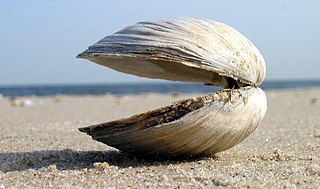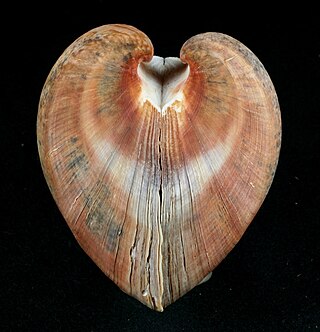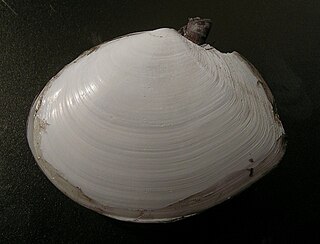
Clam is a common name for several kinds of bivalve molluscs. The word is often applied only to those that are edible and live as infauna, spending most of their lives halfway buried in the sand of the seafloor or riverbeds. Clams have two shells of equal size connected by two adductor muscles and have a powerful burrowing foot. They live in both freshwater and marine environments; in salt water they prefer to burrow down into the mud and the turbidity of the water required varies with species and location; the greatest diversity of these is in North America.

The Pacific razor clam, Siliqua patula, is a species of large marine bivalve mollusc in the family Pharidae.

Ensis is a genus of medium-sized edible saltwater clams, littoral bivalve molluscs in the family Pharidae. Ensis, or razor clams, are known in much of Scotland as spoots, for the spouts of water they eject while burrowing into the sand, when visible at low tide. This term may also colloquially include members of the genus Solen. Ensis magnus are known as bendies due to their slightly curved shell.
Razor clam is a common name for long, narrow, saltwater clams, including:

The Atlantic jackknife clam, Ensis leei, also known as the bamboo clam, American jackknife clam or razor clam, is a large edible marine bivalve mollusc found on the North American Atlantic coast, from Canada to South Carolina. The species has also been introduced to Europe. The name "razor clam" is also used to refer to different species such as the Pacific razor clam or Razor shell.
A siliqua is a Roman silver coin.

Corbicula is a genus of freshwater and brackish water clams, aquatic bivalve mollusks in the family Cyrenidae, the basket clams. The genus name is the Neo-Latin diminutive of Latin corbis, a basket, referring to the shape and ribs of the shell.

The razor shell, Ensis magnus, also called razor clam, razor fish or spoot (colloquially), is a bivalve of the family Pharidae. It is found on sandy beaches in Canada and northern Europe.
The pod razor is a coastal bivalve of European waters. It is edible and has been fished commercially, especially in Portugal, Spain, Ireland and Scotland.

The false ark shells (Cucullaea) are a small genus of marine bivalve molluscs related to the ark clams. The genus is the only member of the family Cucullaeidae.

Pharidae is a taxonomic family of saltwater clams, marine bivalve molluscs in the order Adapedonta. This family of clams is related to the razor shells, a family which is considered to include Pharidae by some authorities.

Macoma is a large genus of saltwater clams, marine bivalve molluscs in the family Tellinidae, the tellins.

Petricola is a genus of saltwater clams, marine bivalve molluscs in the subfamily Petricolinae of the family Veneridae, the Venus clams.

Ensis ensis, or the sword razor, is a razor clam, a marine bivalve mollusc in the family Pharidae. It lives buried in the sand and is found off the coasts of northwest Europe.

Solen is a genus of marine bivalves in the family Solenidae.

Pelecyora is a genus of saltwater clams, marine bivalve molluscs in the family Veneridae, the venus clams.

Paphia is a genus of saltwater clam, a marine bivalve mollusk in the subfamily Tapetinae of the family Veneridae, the Venus clams.

Tagelus is a genus of saltwater clams, marine bivalve molluscs belonging to the family Solecurtidae.

Solecurtus is a genus of saltwater clam, a marine bivalve molluscs in the family Solecurtidae.














